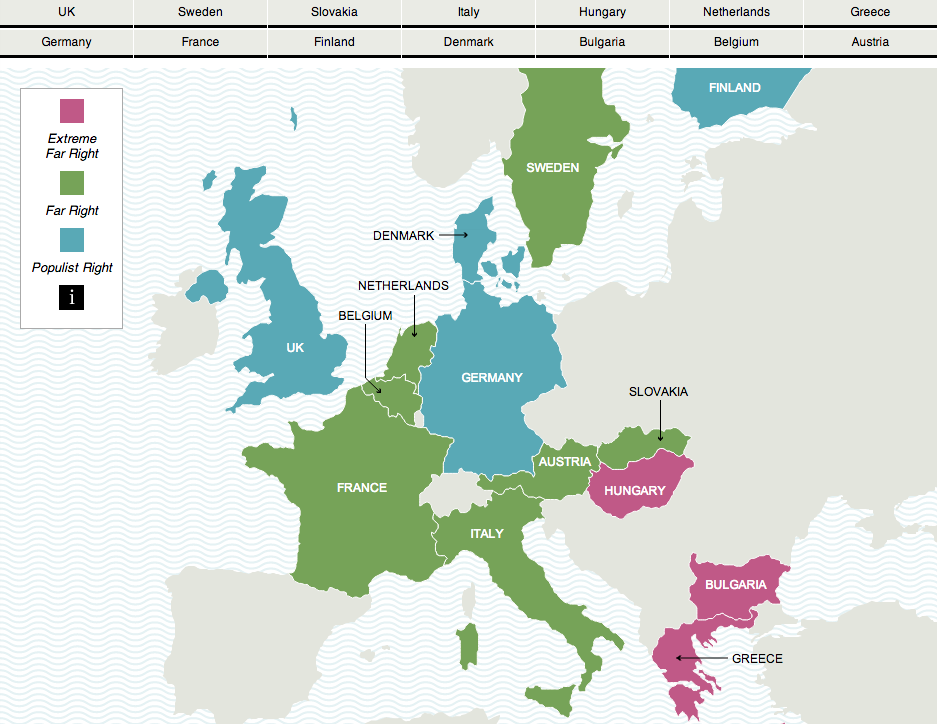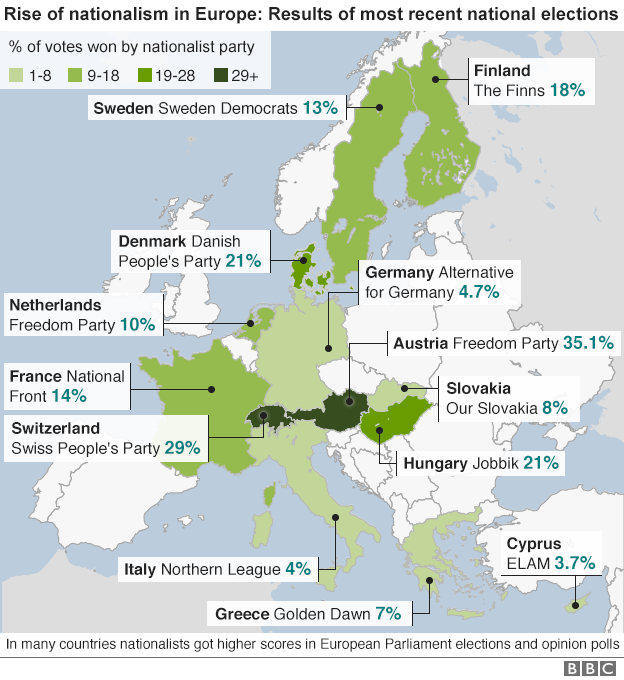Leave won. Trump won. Will Germany, France, Italy, and the Netherlands be next?
Currently; it looks like it. by Christian Nelson,
 The political landscape in Europe has turned increasingly more right-wing in the last few years and those political parties that was once described as fringe are now enjoying increasingly more popular support.
The political landscape in Europe has turned increasingly more right-wing in the last few years and those political parties that was once described as fringe are now enjoying increasingly more popular support.
I've talked about this in another answer and I hope no one will object if I copy & paste it here:
The movement towards extremism (mostly to right), nationalism and anti-establisment has been in the rails for a while now. It first started with Turkey and some other Eastern European countries, then in Britain with emergence of Corbyn on the left and Farage and Brexit on the right. Far-right movements are on the rise in Austria, Netherlands, Belgium, France and Germany (“rise of far-right in Germany” is always a comforting thought) amongst others. I really hoped Trump would lose the election but the unpopularity of Clinton and the rise of nationalism (which has always been prominent in the US) stopped me from getting too hopeful.
The election of Trump further solidified my observations of the last ten years. We will see more of the same in the coming decade.
It fits with the Social Cycle Theory. Besides, 70 years of relative peace is practically unforeseen in human history. That was mainly thanks to the horrors of two incredibly destructive world wars and the fear of total annihilation through nuclear weapons. However the generations that lived through those times are disappearing and they are becoming more and more a distant memory in the collective consciousness of humanity. People are used to peace now, which came about through very careful and considered political processes, which comes across as passive and ineffective to the people today.
The most important thing however is that the economic growth is slowing down globally. People want better standards of living but the population and resources cannot accommodate that. As the competition for resources (that is, for a good life) intensifies, so do people's attitude towards society. Immigration and minority groups are seen as competition that can be eliminated, which gives rise to feelings of xenophobia, nationalism and even racial supremacy. Those who address these -usually unexpressed- emotions and legitimise these fears become popular and ride the wave of populism to power.
This is how Trump won the election.
Most of Europe is slowly coming to a boil with these sentiments as well.
Merkel government in Germany is most likely going to lose the majority in the election next year and a far-right party is almost guaranteed to make significant gains. CDU (Merkel’s party) has already lost the local elections to AfD (Alternative for Germany, an anti-immigrant, extremely conservative fringe party) and something similar is likely to happen in general elections as well, because my German friends in our private talks say they are genuinely worried about and scared of Muslim immigrants.
Right wing conservatism is on the rise in France as well. The National Front party has seen its popularity rise in the last few years and it looks like Marine Le Pen, the leader of National Front, may ascend through the first round of Presidential election. If this does happen, it would be a sign of the people legitimising their ideology and a further popularisation of far-right politics in France, even if she doesn't win the Presidency.
Austria, Netherlands, Switzerland, Greece, Hungary, Sweden, Slovakia have all seen significant rises in far-right movements, with parties of these ideologies making big gains in elections.
Truth of the matter is, Western societies are going through a major historical event right now, exacerbated by the refugee crisis. It is somewhat akin to the migration period Europe went through between 21–700 AD, also known as the Barbarian Invasion. Though I don't like that name and it doesn't quite apply to our time in its scope, it's similar in the way that major societal changes are initiated by immigration and the increased competition for local resources.

Notice how the number of immigrants correlate with increased far-right movements. Though correlation does not mean causation, it is safe to say in this situation that its strongly influenced by it.
Edit: It's apparently not clear to some of you that the first map is not a map of current ruling political parties, but of countries that have seen rises in far-right sentiments in recent years.
So let me make it clear; the first map is NOT a map of current ruling political parties, but of countries that have seen rises in far-right sentiments in recent years.
Disclaimer: Source of first map is the Economist, second one the Telegraph, the third map is from the BBC.
Further reading;
- EU Elections 2014: the rise of the new European Right
- The rise of the far-Right in Europe is not a false alarm
- European Politics Are Swinging to the Right
- The far right is weaselling into the mainstream, dressed up in suits | Paul Mason
- The rise of the far right in Europe
- What explains Brexit, Trump and the rise of the far right?
- What Can Europe’s Far Right Tell Us About Trump’s Rise?
- More on all this
Source: quora.com
